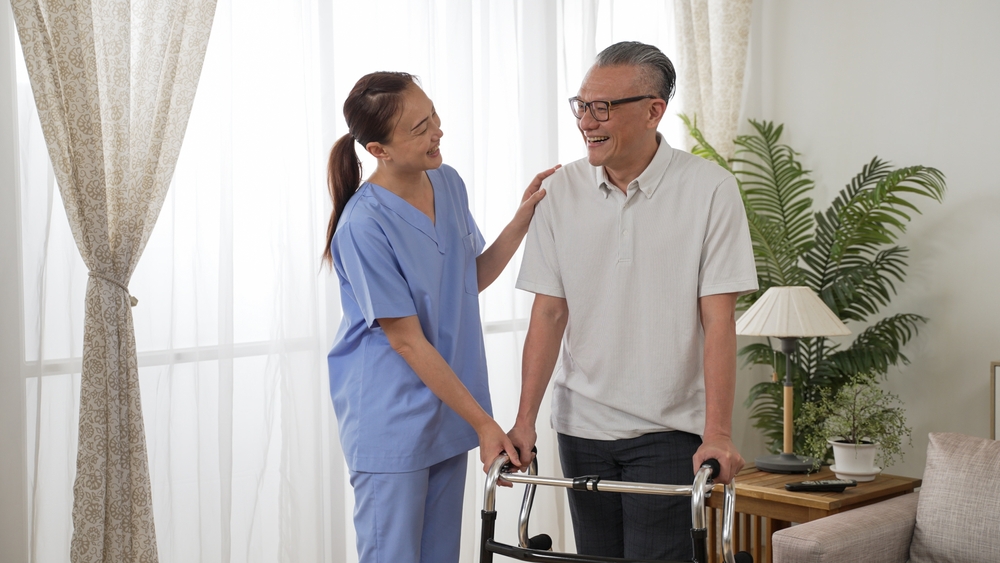When Robert came home from the hospital after knee replacement surgery, his daughter Sarah thought they had everything figured out. She’d taken time off work, stocked the fridge, and moved his bedroom to the first floor. But by day three, she was exhausted and worried—helping her father get dressed left him winded, and she wasn’t sure she was supporting his knee properly during transfers.
That’s when their doctor suggested bringing in a personal care aide, and everything changed.
Recovery at home offers comfort and familiarity that no hospital can match. But the reality of managing pain, mobility limitations, medication schedules, and daily tasks can quickly overwhelm both patients and family caregivers. Personal care aides step into this gap, providing skilled support that helps people heal safely while giving families the breathing room they need.
Why Recovery at Home Needs Professional Support
The hospital discharge process moves quickly. One day you’re in a controlled medical environment with nurses checking on you regularly, and the next you’re home trying to figure out how to shower without putting weight on your surgical leg or remembering which medication to take when.
The Vulnerable Window After Hospital Discharge
The first few weeks after leaving the hospital represent the highest risk period for complications and readmissions. Wounds need proper care, medications must be taken correctly, physical restrictions need to be followed, and warning signs of infection or other problems need to be spotted early. Family members often feel unprepared for the level of vigilance required.
Personal care aides bridge this vulnerable gap. They understand post-surgical protocols, recognize warning signs, and provide consistent daily support that keeps recovery on track. When someone trained is there to help, small problems get addressed before they become serious complications.
Why Families Turn to Professional Care
Even the most devoted family caregivers face real limitations. They have jobs, children, and their own health to manage. Many lack confidence in providing physical assistance—worry about hurting their loved one or causing a fall can make every transfer stressful.
Beyond the physical demands, the emotional weight of watching someone you love struggle through recovery can be draining. Personal care aide services in New York allow family members to focus on emotional support and encouragement rather than becoming the primary caregiver for every physical need.
What Personal Care Aides Actually Do During Recovery
The role of a personal care aide goes far beyond basic assistance. These professionals bring training, experience, and calm competence to situations that might feel overwhelming to family members.
Help with Daily Activities

Morning routines that once took fifteen minutes can become hour-long ordeals when you’re recovering. Personal care aides help with bathing, using techniques that keep surgical sites dry and protected. They assist with dressing, working around mobility restrictions and medical equipment. Grooming tasks that require standing, reaching, or fine motor control become manageable with an extra pair of trained hands.
These aren’t tasks performed on the patient—they’re collaborative efforts that encourage as much independence as possible while providing support where it’s needed. A skilled aide knows when to step in and when to step back, fostering recovery rather than dependence.
Mobility Support and Fall Prevention
Falls represent one of the most serious risks during home recovery. Personal care aides are trained in proper transfer techniques, using correct body mechanics to safely help patients move from bed to chair, chair to bathroom, or manage stairs when necessary.
They understand how to use assistive devices properly and can spot environmental hazards that families might overlook. That throw rug in the hallway, the electrical cord crossing the walking path, the dim lighting near the bathroom—a PCA identifies and helps address these risks before they cause problems.
Medication Reminders and Monitoring
Post-surgical medication regimens can be complex. Pain medication at certain intervals, antibiotics with specific food requirements, blood thinners that can’t be mixed with certain other medications—keeping track requires vigilance.
Personal care aides provide medication reminders and help ensure medications are taken correctly. While they don’t administer medications (that requires nursing licensure), they can observe and report concerning symptoms or side effects. Managing medications during recovery time becomes more reliable with professional oversight.
Meal Preparation and Nutrition
Good nutrition accelerates healing, but preparing meals requires energy that recovering patients often lack. Personal care aides can prepare nutritious meals that align with any dietary restrictions, ensuring patients eat regularly even when appetite is low.
They pay attention to hydration, encourage protein intake for wound healing, and can report concerning signs like persistent nausea or inability to keep food down. When someone’s focused on your nutritional needs, recovery stays on track.
Companionship and Emotional Support
Recovery can be lonely and frustrating. Days blur together, independence feels lost, and anxiety about healing properly weighs heavily. The presence of a kind, encouraging professional provides emotional stability during a difficult time.
Personal care aides offer conversation, encouragement, and a calm presence. They’ve seen people recover from similar situations before. Their reassurance that what you’re experiencing is normal, that progress is happening even when it feels slow, provides comfort that family members—worried and stressed themselves—may struggle to offer.
Light Housekeeping and a Safe Environment
Maintaining a clean, organized space supports recovery. Personal care aides handle light housekeeping tasks that keep the immediate environment comfortable and safe—making the bed, keeping surfaces clear of clutter, ensuring the bathroom and recovery area stay clean.
This isn’t about deep cleaning the whole house. Rather, these tasks focus on maintaining the specific spaces where the recovering person spends time, reducing fall risks and promoting the kind of calm, ordered environment that supports healing.
The Benefits of Having a PCA During Recovery
The decision to bring in professional support often comes after families realize they need more help than they initially expected. The benefits extend to both patients and their loved ones.
Faster, Safer Healing
When someone trained monitors your recovery daily, problems get caught early. Personal care aides notice subtle changes—increased swelling, changes in wound appearance, declining mobility—and communicate these observations to family members and healthcare providers.
This vigilance helps prevent complications that could derail recovery or lead to hospital readmission. Consistent support means medication schedules are followed, physical therapy exercises get done, and activity restrictions are respected even when patients start feeling better and want to push too hard too soon.
Reduced Hospital Readmission Risk
Hospital readmissions within 30 days of discharge are common and concerning. Often they result from infections that weren’t caught early enough, medications taken incorrectly, falls, or patients overdoing activity before they’re ready.
Personal care aides significantly reduce these risks. Their daily presence means someone knowledgeable is monitoring the situation and can alert medical providers at the first sign of trouble. When recovery progresses smoothly at home, expensive and demoralizing return trips to the hospital become far less likely.
Peace of Mind for Family Members
Perhaps the greatest benefit is emotional. Family members can go to work knowing their loved one has competent help at home. They can sleep through the night without worrying about overnight falls. They can be present as family—offering love and encouragement—without bearing the full weight of physical care.
This peace of mind benefits everyone. The patient doesn’t carry guilt about burdening family members. Adult children aren’t stretched impossibly thin trying to balance work, their own families, and caregiving responsibilities. Spouses aren’t exhausted from providing round-the-clock assistance.
How PCAs Help with Hospital-to-Home Transitions
The move from hospital to home represents a critical juncture in recovery. Personal care aides make this transition smoother and safer.
Coordinating the Discharge Plan
When a personal care aide becomes part of the care team, they can coordinate with hospital staff to understand exactly what the patient needs at home. What are the activity restrictions? Which warning signs require immediate medical attention? What does the medication schedule look like?
Having this information flow to someone who will be providing daily care creates continuity that might otherwise get lost in the shuffle. The transition from hospital to home becomes less jarring when professional support is already in place.
Personalized Recovery Plans
Every recovery is different. The aide works with the patient, family, and medical team to understand the specific needs and goals. Someone recovering from cardiac surgery has different needs than someone healing from hip replacement, and the care provided reflects these differences.
This personalization extends beyond medical needs to personal preferences. Some patients want encouragement to push themselves, while others need gentle reminders to slow down. Some want lots of conversation, while others prefer quiet companionship. Personal care aides adapt their approach to support each individual’s healing journey.
Making the Decision to Bring in Help
Many families hesitate to bring in outside help, feeling they should be able to handle recovery on their own. Understanding when professional support makes sense can prevent unnecessary struggle.
When PCA Support Makes the Most Sense
Consider bringing in a personal care aide when recovery requires significant physical assistance, when the patient lives alone or primary caregivers work full time, when mobility limitations create fall risks, or when the medication regimen is complex.
If family caregivers are feeling overwhelmed, stretched too thin, or worried about providing safe physical assistance, these are signs that professional support could help. There’s wisdom in recognizing your limitations and bringing in trained help before a crisis occurs.
How to Get Started
Getting started with personal care aide services is more straightforward than many families expect. Contact our team to discuss your situation and needs. A care coordinator will assess the level of support required and help develop a plan that fits your situation.
Many people need full-time support initially, then gradually reduce hours as recovery progresses. Others need help just during specific times of day—mornings for bathing and dressing, or evenings when fatigue makes tasks harder. The beauty of home care is this flexibility.
Understanding the Difference Between PCAs and Other Care Levels
It’s helpful to understand where personal care aides fit in the spectrum of home care. PCAs provide assistance with daily living activities and can offer companionship and basic monitoring. They don’t provide medical care like wound care, IV administration, or complex medication management—those tasks require skilled nursing.
For many recovery situations, the PCA level of care is exactly what’s needed. If you’re unsure whether your situation requires a PCA or skilled nursing, agencies like our compassionate care team can help assess your needs and recommend the right level of support. Resources like understanding the difference between CDPAP to PCA options can also clarify which program best serves your situation.
Real Support for Real Recovery
Recovery at home shouldn’t feel like an overwhelming struggle. With the right support from a trained personal care aide, healing can happen safely, comfortably, and with the dignity every person deserves.
The role these professionals play goes far beyond checking tasks off a list. They bring calm expertise to an uncertain time, provide physical assistance that prevents complications, offer emotional support that lifts spirits, and give family members the space to be family rather than overwhelmed caregivers.
When you’re facing recovery—whether planned surgery or unexpected illness—don’t assume you have to manage everything alone. Professional help is available, and bringing in a personal care aide might be one of the best decisions you make for your healing journey.
For more information about personal care aide services and how they can support your recovery, explore our home health care beginner guide or choosing the right home care agency for your needs. Your recovery matters, and you deserve support that helps you heal well.

